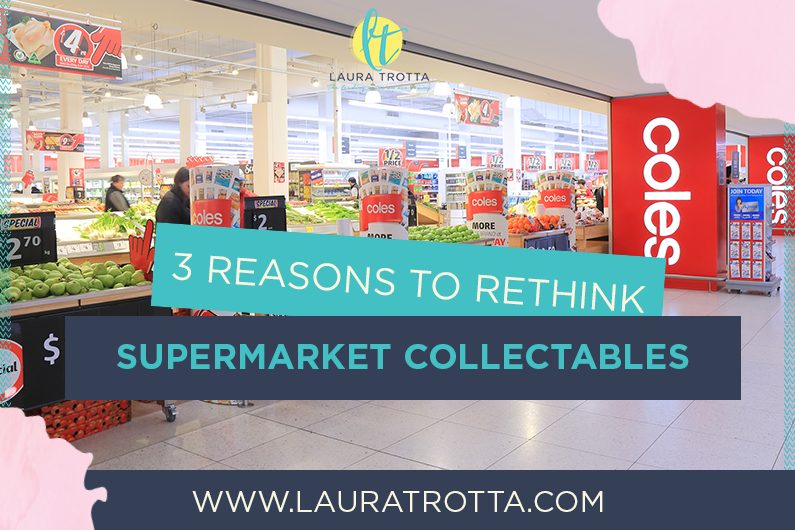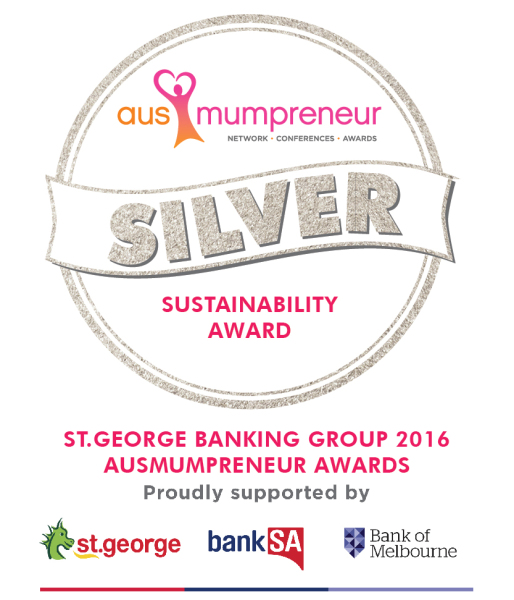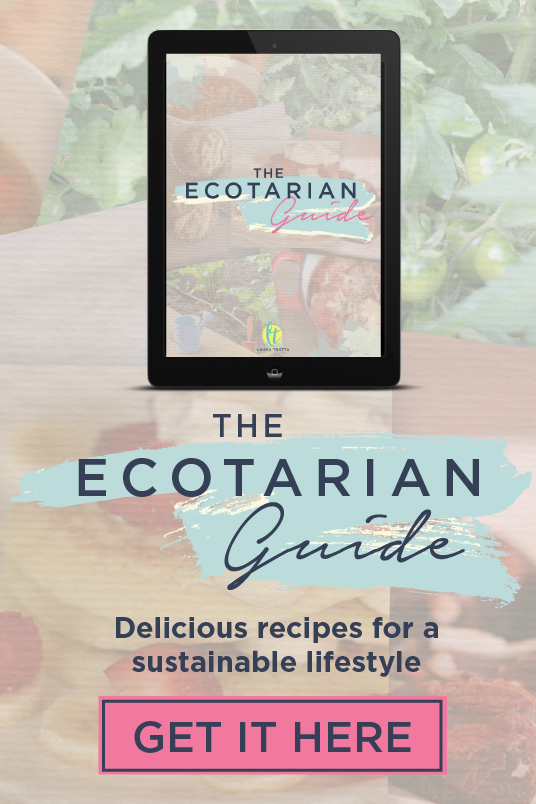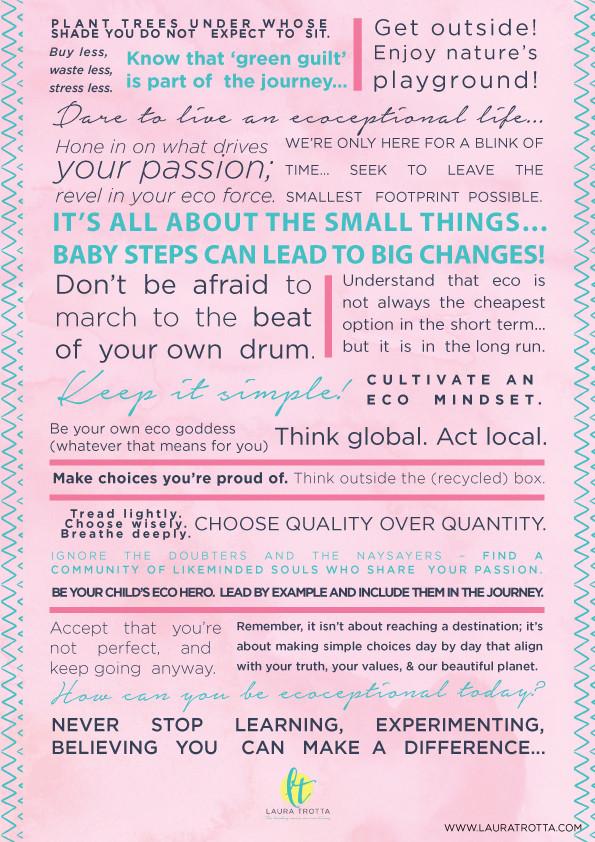In this post I discuss the marketing genius and environmental nightmare of the Coles Little Shop promotion and share three reasons why you should rethink supermarket collectables.
Kids love collecting things and marketers know it.
Whether it’s a new Thomas the Tank Engine train, a set of toys in McDonalds Happy Meals or the latest season of footy cards, there’s never-ending options of collectables where kids are concerned.
Supermarkets, in a bid to up their market share, often offer free collectables to “reward” their shoppers. Or more specifically, their “Little Shoppers”, the children of their customers.
Coles new Little Shop promotion is one such promotion.
Until 28th August, Coles shoppers will be offered a free toy – a miniature version of 30 well-known household products – with every $30 spent.
The promotion will no doubt be popular with millions of families, however the health and environmental costs of such a promotion shouldn’t be understated.
Let’s take a look at the marketing genius and environmental nightmare of the Coles Little Shop collection and the three reasons why you should rethink supermarket collectables.
Podcast: Play In New Window
Subscribe in iTunes (also on Spotify)
Last week during the school holidays I took the boys to see a movie. It was during the advertisements before the movie started when I first saw the Me Bank ad. Emojis danced across the screen singing “me me me me” to the tune of the Halleluiah Chorus and every child in the cinema (including mine) started singing along.
It was catchy and our entire household has had the song in our heads all week as a result.
I share this story because marketing to children is effective.
Children are easily influenced – they love a good slogan, a catchy tune and better still, they love a freebie… especially miniature collectables!
Where I was happy as a young girl in the early 1980s collecting rocks and used postage stamps, kids these days have endless options of “new things” to collect.
The Coles Little Shop collection is a dream come true for any child that has a dolls house, teddies, a toy kitchen or shop (i.e. most children!). At last Barbie can eat a Tim Tam, drink Milo and brush her teeth with Colgate!
Surely we should all be super happy and grateful for Coles for providing our kids with free toys, yes?
Not quite.
Before you jump on board and start collecting Little Shop miniature toys in earnest, take a moment to consider these three points…..
1. Little Shop Collectables Contribute To Plastic Pollution
More than 8 million tonnes of plastic are dumped in our oceans every year and it’s estimated that by the year 2015, there will be more plastic than fish in the world’s oceans.
Consumers are becoming more aware of the impact of plastics on our environment and health and are looking towards government and leading corporations to take leadership on the issue.
The recent #BanTheBag campaign and phase out of plastic bags in Australia’s Eastern States is a positive move in the right direction, as is the provision of Redcycle bins inside supermarkets for consumers to drop off their soft plastics for recycling.
But just when we thought our major supermarkets were starting to listen where plastic were concerned, Coles has rolled out another collectables campaign, one that undermines its efforts to reduce plastics in their stores.
The Little Shop minis are made from various materials including paper, cardboard, plastic and foam, and “where possible” from the same material as the original product, although some, including the mini bananas and bottled water, are made from hard plastics.
Each mini is also individually wrapped in soft plastic.
These wrappers could be recycled through the Redycle bins, however there is no recycling option for the toys themselves.
Furthermore, the “surprise” element of the toys and not knowing what‘s in each packet drives the ongoing purchase and collecting in order to get the full set. If these toys are anything like the Woolworths Marvel Super Hero Discs from 2016 where one in six discs was a “rare” disc, families will have collected hundreds before they complete their set.
Initiative like the Little Shop collectables make it difficult for consumers to believe that Coles are serious about reducing plastic pollution. They only undermine any good efforts the company is making in this area.
2. Little Shop Collectables Promote Products That Harm the Environment and Human Health
The range of Little Shop miniature collectables incudes numerous lines of processed foods, drinks and chemical cleaners. Think two minute noodles, Nutella choc hazelnut spread, Oak flavoured milk, White King Toilet Cleaner and Vanish laundry soaker.
With health conditions like obesity, asthma, autism and auto immune diseases on the increase in our society, and countless studies linking toxins in our environment and diet with many of these conditions, we need to question the logic behind promoting products high in sugar, artificial flavours and preservatives, or harsh chemicals.
Sure, many of the products in the Little Shop promotion are “iconic brands” but are these brands the best for our health and the health of our planet?
The promotion also includes a tiny plastic Mount Franklin water bottle. According to the latest Australian plastics recycling survey, Australians recycle only 36% of PET plastic drink bottles, and 373m water bottles end up in landfill each year.
Promoting the consumption of bottled water again undermines any initiatives Coles is making to reduce plastic consumption and environmental harm.
3. Little Shop Collectables Markets Brands Directly to Your Kids
The genius behind the Little Shop collectables is that they target children.
Brands know that brand loyalty starts young, and being included in this range ensures that brands are getting in early for the next generation of consumers.
It’s why the brands themselves are paying to be included in this promotion.
Sure it’s aimed at a fun exercise, but there’s nothing fun about having your kids throw a tantrum in a supermarket aisle because you refused to buy a jar of Nutella (been there, done that by the way!).
But again, brands know all this and know that nine times out of ten a tired parent will just buy the Nutella to appease their child.
What we, as consumers, need to consider though is if this sort of marketing is even ethical. And if you don’t believe it is, voice your opinion and write to Coles Head of Marketing.
Final Thoughts
Coles Little Shop miniature collectables are at a supermarket near you. Please consider the three points above before deciding if you’ll accept the “free” toy with every $30 you spend. While the toy is free now, at some stage our society will pay the environmental and health cost of the initiative.
Over to you…. will you be collecting the Coles Little Shop Collectables?
Like this Post?
You may also like:
The Environmental Impact of Toys
The Lifecycle of a Fidget Spinner
What You Need To Know About Plastics
19 Ways To Break Up With Plastic In Your Home
Where Reduce Reuse Recycle Got It Wrong
How Our Plastic Oceans Are Impacting the Environment with Craig Leeson
Podcast: Play in new window | Download
- Sustainable Home Design- factors to consider to maximise sustainability - July 28, 2022
- Advantage and Disadvantages of Tiny Houses - May 31, 2022
- How School Strike 4 Climate is Empowering Youth to Fight for Their Future - May 1, 2022


 Laura Trotta is one of Australia’s leading home sustainability experts. She has a Bachelor of Environmental Engineering, a Masters of Science (in Environmental Chemistry) and spent 11 years working as an environmental professional before creating her first online eco business, Sustainababy, in 2009. She has won numerous regional and national awards for her fresh and inspiring take on living an ‘ecoceptional’ life (including most recently winning the Brand South Australia Flinders University Education Award (2015) for the north-west region in SA and silver in the Eco-friendly category of the 2015 Ausmumpreneur Awards). With a regular segment on ABC Radio and with her work featured in publications like Nurture Parenting and My Child Magazine, Laura is an eco thought leader who’s not afraid to challenge the status quo. A passionate believer in addressing the small things to achieve big change, and protecting the planet in practical ways, Laura lives with her husband and two sons in outback South Australia.
Laura Trotta is one of Australia’s leading home sustainability experts. She has a Bachelor of Environmental Engineering, a Masters of Science (in Environmental Chemistry) and spent 11 years working as an environmental professional before creating her first online eco business, Sustainababy, in 2009. She has won numerous regional and national awards for her fresh and inspiring take on living an ‘ecoceptional’ life (including most recently winning the Brand South Australia Flinders University Education Award (2015) for the north-west region in SA and silver in the Eco-friendly category of the 2015 Ausmumpreneur Awards). With a regular segment on ABC Radio and with her work featured in publications like Nurture Parenting and My Child Magazine, Laura is an eco thought leader who’s not afraid to challenge the status quo. A passionate believer in addressing the small things to achieve big change, and protecting the planet in practical ways, Laura lives with her husband and two sons in outback South Australia. 


